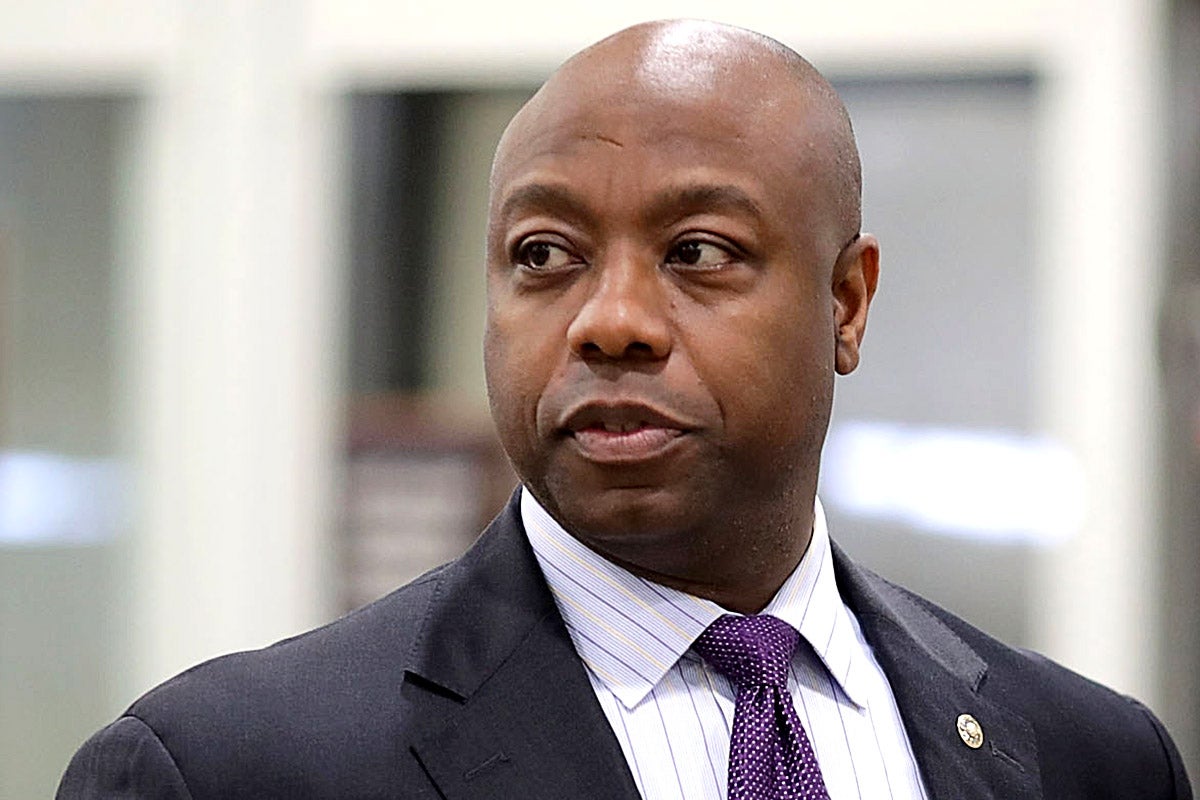On Thursday, South Carolina Sen. Tim Scott, the only black Republican member of the Senate, announced he would oppose President Donald Trump’s controversial nomination of conservative lawyer Thomas Farr to the federal judiciary. In a written statement, Scott said he was moved to opposition after reading a 1991 Justice Department memo that “shed new light on Mr. Farr’s activities.” That memo, published by the Washington Post this week, shows that Farr was involved in former North Carolina Sen. Jesse Helms’ 1990 re-election campaign, which was accused of trying to intimidate black voters in the state.
Farr’s career continued to intersect with voter suppression efforts. In 2011, North Carolina’s GOP-controlled legislature hired him to defend racially gerrymandered maps for federal and state office. Later, he was hired to defend a voter identification law that a federal appeals court would strike down for “targeting African Americans with almost surgical precision.” Farr’s hostility to voting rights is why he was met with immediate condemnation from civil rights groups when he was nominated last year. “His legal career has been dedicated to opposing the rights of workers and denying African Americans full participation in our democracy,” said Sherrilyn Ifill, president of the NAACP Legal Defense Fund. “His record is repugnant and provides ample grounds to oppose his confirmation.”
Together with Senate Democrats and Arizona Sen. Jeff Flake—who is blockading the president’s judicial nominees until the Senate votes on a protection bill for FBI special counsel Robert Mueller—Scott’s opposition sinks Farr’s chances of confirmation. Unless Trump renominates him in the next Congress, Farr will not serve on the federal bench.
This marks the second time Tim Scott has broken party ranks to oppose a judicial nomination on the basis of the nominee’s racial insensitivity. Earlier this year, he opposed Ryan Bounds’ nomination to the 9th U.S. Circuit Court of Appeals, citing college writings where Bounds attacked “race-focused groups” and “race thinking.” “After talking with the nominee last night and meeting with him today, I had unanswered questions that led to me being unable to support him,” said Scott at the time. Fearing defeat, the White House withdrew Bounds’ nomination.
Tim Scott keeps doing this because Trump keeps choosing judicial nominees with reactionary views on race and voting rights, and Senate Republicans keep waving them through. Florida Sen. Marco Rubio joined Scott against Bounds but supports Farr; Jeff Flake stands with Scott on Farr but supported Bounds.
None of this surprises—the essence of Trumpism is racist demagoguery in service of racial hierarchy—but it is clarifying. Support for these nominees is nearly unanimous, and joined by disregard for the accusations. “Most of what you’ve heard from the left about Thomas Farr is utterly false character assassination nonsense,” tweeted Sen. Orrin Hatch of Utah, who sits on the Senate Judiciary Committee. Sen. Susan Collins of Maine, a celebrated Republican moderate, said Farr had denied any role in Jesse Helms’ anti-black intimidation tactics. “He in fact told me he was disgusted by it,” she said. “He clearly played no role in drafting it, approving it or even seeing it before it was sent.” That Farr was engaged in recent voter suppression apparently makes no difference for her support, or that of Alaska Sen. Lisa Murkowski, another moderate who backs the nomination.
What we see here, and what we’ve seen since Shelby County v. Holder unleashed modern voter suppression techniques, is a complete lack of Republican opposition to the ongoing drive to discourage and disenfranchise Democratic constituencies, and black Americans in particular. Moderate Republicans are just as indifferent as their most conservative colleagues. Even supporters of criminal justice reform like Kentucky Sen. Rand Paul or Iowa Sen. Chuck Grassley have little to say about dedicated efforts from co-partisans across the country to keep black people from voting.
It’s the same silence Republicans show in the face of the president’s explicit racism, and it reflects, if not cowardice, then a recognition of the Republican Party’s political standing. Broad, equitable access to the ballot threatens a GOP whose electoral success depends on a narrow (if large) segment of the voting public. Without draconian voting systems in Florida, Mississippi, and Texas, the GOP may not have survived the midterms with its Senate majority; without racial gerrymandering, Republican legislative majorities in North Carolina, Ohio, and Wisconsin may not have withstood the “blue wave” of energy and activity.
Outgoing Rep. Mia Love of Utah—the only black Republican woman in Congress and, along with Scott and Rep. Will Hurd of Texas, one of three black Republicans in the national legislature overall—used her concession speech on Monday to blast her GOP colleagues for their inattention to the concerns of nonwhites and their communities. “This election experience and these comments shine a spotlight on the problems Washington politicians have with minorities and black Americans—it’s transactional,” she said. “It’s not personal.”
This is a harsh judgment given her context as an outgoing Republican elected official, but it’s almost tame given the full scope of the GOP’s failure on this question. Washington Republicans have embraced a racist president. They have turned a blind eye to voter suppression and disenfranchisement. Their statement about who counts in America is not the least bit ambiguous.
